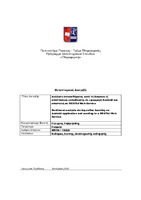Aνάλυση συναισθήματος κατά τη διάρκεια εξ αποστάσεως εκπαίδευσης σε εφαρμογή Android και αποστολή σε RESTful Web Service
Sentiment analysis during online learning on Android application and sending to a RESTful Web Service

Προβολή/
Λέξεις κλειδιά
Android ; Tensorflow Lite ; Spring Boot ; Mηχανική μάθηση ; Συνελικτικό νευρωνικό δίκτυο ; Ανάλυση συναισθήματος προσώπου ; RESTful web service ; Java ; Python ; PostgreSQLΠερίληψη
Στην παρούσα διπλωματική εργασία παρουσιάζεται η διαδικασία δημιουργίας μιας Android εφαρμογής για ανάλυση των συναισθημάτων των φοιτητών πανεπιστημίου κατά τη διάρκεια εξ αποστάσεως εκπαίδευσης. Συγκεκριμένα, η εφαρμογή προσομοιώνει τη διδασκαλία ενός μαθήματος μέσω κάμερας και πραγματοποιεί, ανά ορισμένο χρονικό διάστημα, ανάλυση συναισθήματος προσώπου όσων φοιτητών έχουν δώσει την απαραίτητη άδεια στην εφαρμογή, στέλνοντάς την πρόβλεψη του αλγόριθμου από τις κινητές συσκευές τους, που λειτουργούν ως clients, σε μια βάση δεδομένων μέσω web service. Από τα περιεχόμενα της βάσης δημιουργούνται ποσοτικά δεδομένα στα οποία έχει πρόσβαση ο διδάσκων καθηγητής, ο οποίος, παρατηρώντας τα, μπορεί να αντλήσει συμπεράσματα για την επίδραση του τρόπου παράδοσής του είτε σε συγκεκριμένη διάλεξη είτε και διαχρονικά, καθώς εξελίσσεται το εξάμηνο σπουδών. Μια υλοποίηση όπως η παραπάνω, με κάποιες επεκτάσεις, θα μπορούσε να χρησιμοποιηθεί είτε αυτόνομα είτε να προσαρτηθεί σε ήδη ευρέως χρησιμοποιούμενες πλατφόρμες, για την εξασφάλιση της ποιότητας του μαθήματος σε συνθήκες εξ αποστάσεως εκπαίδευσης, μέσω της σχεδόν άμεσης ανατροφοδότησης του καθηγητή ως προς την απήχηση του περιεχομένου και της μεθόδου διδασκαλίας του στους φοιτητές.
Στις επόμενες σελίδες γίνεται αρχικά μια επισκόπηση των νευρωνικών δικτύων και συγκεκριμένα μιας υποκατηγορίας τους, του συνελικτικού νευρωνικού δικτύου, ένα μοντέλο του οποίου χρησιμοποιήθηκε για την αναγνώριση συναισθήματος των φοιτητών, της βιβλιοθήκης Tensorflow Lite που επιτρέπει την ανάπτυξη μοντέλων μηχανικής μάθησης σε περιβάλλον Android συσκευής καθώς και του Spring Boot framework, με το οποίο δημιουργήθηκε το RESTful web service για την εφαρμογή. Στη συνέχεια παρουσιάζεται η διαδικασία της εκπαίδευσης του νευρωνικού δικτύου, του σχεδιασμού της βάσης δεδομένων, και της ανάπτυξης του κώδικα της εφαρμογής. Τέλος, γίνεται αναφορά στα συμπεράσματα που προέκυψαν από την υλοποίηση και σε πιθανές μελλοντικές επεκτάσεις.

